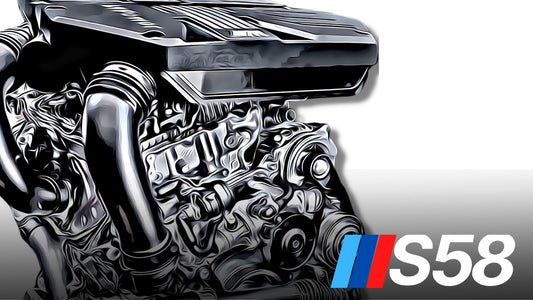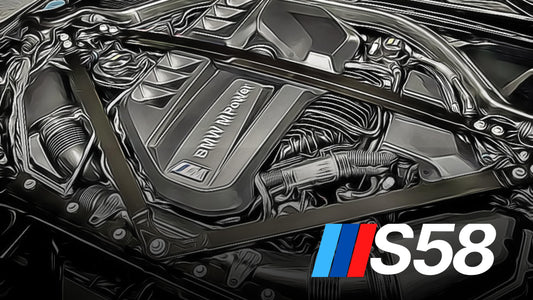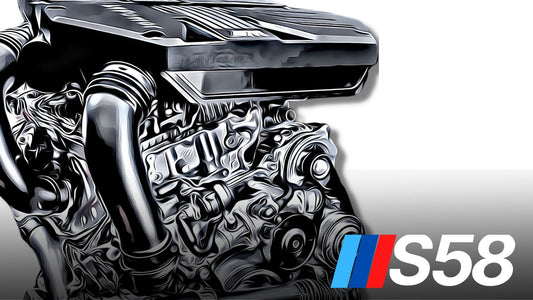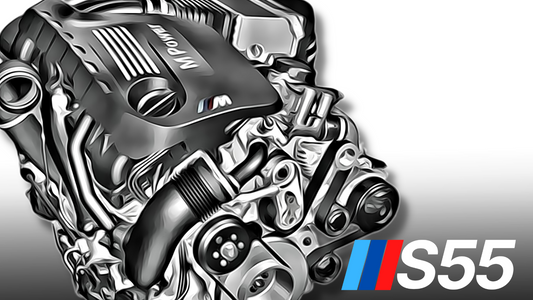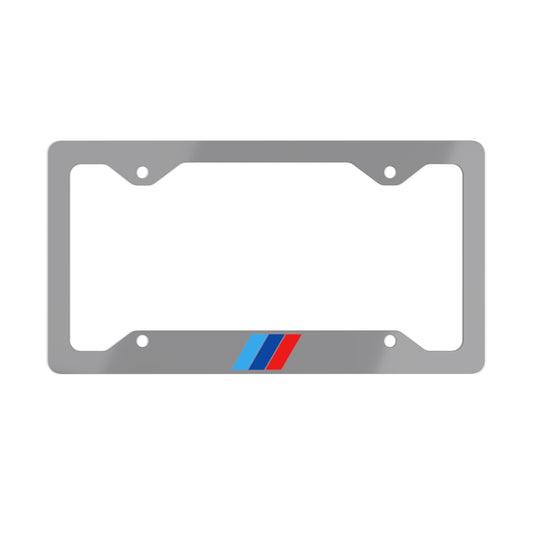Nearly three years after the N63's introduction, BMW unveiled a high-performance variant dubbed the S63. When it comes to BMW performance engines, the S63 is the pinnacle and perhaps one of the most competent engines available today.
BMW's first twin-turbo V8 engine, the N63, debuted over 15 years ago and continues to power some of the company's largest vehicles. This legendary powerplant was used in everything from the 5-Series to the X7.
Nearly three years after the N63's introduction, BMW would unveil a high-performance variant of the engine dubbed the S63. When it comes to BMW performance engines, the S63 is the pinnacle and perhaps one of the most competent engines available today.
After more than a decade on the market, BMW has made significant improvements to the S63 to make the models we get to enjoy today far more dependable than their predecessors.
Everything you need to know about the BMW S63 is right here, from the technology it boasts to the vehicles it propels to the possible issues you may encounter as an owner.
Inside The BMW S63 Engine
The BMW S63 shares a lot of components with the standard BMW N63 engine. The latter was the first mass-produced vehicle to use the innovative "hot-vee" V8 engine design. In this engine layout, the turbocharger sits in the valley formed by the cylinders, which may seem strange to those unfamiliar with the term. This is in contrast to a traditional V-engine, which places the intake manifolds on the exterior and the exhaust manifolds in the middle of the cylinder banks.
More room may be saved in the engine compartment with a hot-vee configuration than a traditional turbocharger system. Additionally, it shortens the path that hot air must go from the tailpipe to the turbochargers, which speeds up the spooling process and keeps the components cooler. There are two twin-scroll turbochargers powering the S63's engine. In addition, there was a pulse-tuned, cross-engine exhaust manifold installed. This made sure that there was a steady flow of exhaust air to the turbos even when the plane turned 180 degrees.
BMW's Valvetronic variable valve lift technology wasn't standard on the S63 when it initially came out. With the subsequent "Technical Update," it debuted with other significant mechanical improvements.
BMW S63 Engine Versions
The S63 is the most powerful engine BMW has dropped into a production vehicle, thanks to the mechanical wizards at the M Division. The latest iteration of this engine is found in the new BMW M5 CS, which makes it the most powerful BMW ever produced, with 635 horsepower and 553 pound-feet of torque.When it was released in 2011, the S63 was roughly 100 hp less powerful than the previous generation's X5 M (E70) and X6 M (E71). The German company has made significant progress in the past decade, releasing four engine variants.
S63B44O0
The first engine in the S63 series was the S63B44O0. In 2011, when it first hit the market, it generated 547 horsepower at 6,000 rpm and 502 lb-ft of torque between 1,500 and 5,650 rpm. In 2013, BMW ceased production of the engine.
S63B44T0
BMW presented the S63B44T0, or the first "technical update," for the S63B44O0 a year after its initial introduction. When the S63 engine was updated with Valvetronic technology and a greater compression ratio, it was one of the most important upgrades in the engine's lifetime (up from 9.3:1 to 10:1).
Due to the upgrade, the engine's maximum rpm increased from 6,800 to 7,200, a figure still used by modern S63 models.
While there have been significant mechanical improvements, the updated engine still produces 553 horsepower between 6,000 and 7,000 rpm and 502 lb-ft of torque between 1,500 and 5,750 rpm on paper. Up until 2018, the S63B44T0 was widely available.
S63B44T2
From 2015 to 2018, the S63B44T2 was manufactured. It topped out at 567 horsepower at 6,000 to 6,500 revolutions per minute (rpm) and 553 pound-feet of torque within the 2,200 and 5,000 revolutions per minute (rpm).
S63B44T4
The S63B44T4 is the latest generation of the S63 engine and is still manufactured today. There are many different variations of the engine's tuning that may be selected.The maximum power output varies between 591 and 635 horsepower between 5,600 and 6,700 revolutions per minute (rpm). Still, the maximum torque output is a consistent 553 lb-ft (nm).
Which BMWs Come With The S63?
Although it has considerable abilities, BMW has only included the S63 in the highest tier of its M lineup. The X5 M, X6 M, M5, M6, and M8 are all included.S63B44O0
From 2010-2013, the S63B44O0 was used only in the BMW X5 M (E70) and X6 M (E71). From 2011 to 2014, the Wiesman GT MF5 also utilized this motor.S63B44T0
First seen in the F10 5-series M5, the S63B44T0 would go on to power subsequent M6 models.
- 2011–2017 BMW M5 (F10)
- 2012–2018 BMW M6 (F12/13)
- 2013–2018 BMW M6 Gran Coupé (F06)
S63B44T2
The S63B44T2 replaced the S63B44O0 and was used in the X5 M (F85) and X6 M (F86) from 2015 to 2019.
S63B44T4
The S63B44T4 engine variant is the most popular choice for most applications. This engine is found in the following BMW models:- 2018–present M5 (F90)
- 2018–present M5 Competition (F90)
- 2019–present M8 (F91/92/93)
- 2019–present M8 Competition (F91/92/93)
- 2020–present X5 M (F95)
- 2020–present X5 M Competition (F95)
- 2020–present X6 M (F96)
- 2020–present X6 M Competition (F96)
How Much Horse Power (HP) Can The BMW S63 Engine Handle?
The S63 can easily generate over 750 horsepower with only a few simple upgrades, including an ECU tune and a performance exhaust. The 4.4-liter V8 engine, even in its standard configuration, generates an incredible 635 horsepower and 553 pound-feet of torque.
To increase boost pressure beyond the range that the factory turbochargers can provide, you will need to invest in some high-performance aftermarket components.
Power numbers may go as high as 800 hp with more involved modifications such as a performance crank and piston set, aggressive cam profiles, and high flow injectors, but such tuning can be quite taxing on the engine. The rod bearings in substantially modified S63 engines have reportedly failed on many occasions.
How Reliable Is The BMW S63 Engine?
The S63 has been around for a little over a decade, and in that time, BMW released many major modifications. BMW has fixed most of the issues that made early models of the S63 unreliable in subsequent models. Still, since this is a high-performance engine with a history of mechanical problems, it's best to watch out for the following problems that have been reported in S63s:
Issues with Rod Bearings
There is a common concern concerning the S63's rod bearings that causes many people to think twice before buying one. Forum users have posted many messages inquiring about the seriousness of the situation, and some have even reported it.
The BMW S54, S65, and S85 all have a history of allegations of defective rod bearings. To be sure, this isn't as prevalent as you may expect. An engine with regular maintenance should have no problems with the rod bearings wearing out. However, if an engine ever ran out of oil, you can bet on it breaking down.
It's important to remember that even very careful engine owners have had bearing problems. This does not happen very often however.
A rod-bearing failure often leads to a banging engine, which can have very bad results. Bearing failure causes crankshaft damage, which in turn impedes piston motion. Rod knock refers to the resulting deep tapping sound from inside the engine.
As we talked about, a bad rod bearing is easy to spot because it makes a knocking sound and there are copper shavings in the engine oil. We certainly hope you'll never have to deal with the many thousand dollars it would cost to fix a rod bearing problem.
Excess Oil Consumption
The ordinary N63 in its earlier iterations sucked through oil at an exceptional rate, thus, prospective buyers of used BMW S63 engines should tread carefully. Because the oil must lubricate and cool the turbos, turbocharged engines often require more oil than similarly sized normally aspirated units. However, the original N63 used an exceptionally high amount of oil.
There were a few causes behind the engine's excessive oil consumption. Piston ring failure, leaking oil seals in the turbocharger, a leaking crankcase vent hose, and fractured valve stem seals are among the most serious problems. BMW recognized this as an issue with the basic N63, therefore, they made changes to the design of the valve guides to reduce the clearances and replaced the problematic component at no cost.
As we've already established, this was an issue with the baseline N63, and BMW did patch it up not long after it was discovered. Oil usage that looks out of the ordinary warrants having the engine inspected, but it's doubtful that you'll have comparable problems with the S63.
Trouble with VANOS's Solenoids
BMW refers to its variable valve timing system as VANOS. The S63 has dual VANOS, which means the intake and exhaust valve timing can be adjusted independently of one another. While this is an established technology, BMW's use of it has been plagued by problems with components wearing out too soon. The VANOS solenoids are the most vulnerable of these components.
Solenoids are always active during engine operation, moving camshafts into their designated positions. Naturally, they'll start to show their age once some time has passed. The issue arises when failures occur earlier than anticipated. If you maintain your engine properly, the solenoids should last for more than 100,000 kilometers.
Even while the solenoids aren't very expensive, the BMW S63 has four of them, so if more than one of them break, the bill may mount up. If the solenoid is broken, the car will have a rough idle, stutter, and perform poorly. In extreme circumstances, it might cause your engine to enter limp mode.
Failed Ignition Coil
Ignition coil failure, like that of the VANOS solenoids, is more often the result of neglect than of a flaw in the component's design or construction. High-performance, turbocharged engines may be rough on the ignition system, so it's important to check the coils more often than you would for most other cars.
Once one ignition coil dies, they all eventually will. Engine misfiring and stuttering, erratic idling, and unexpected decreases in power are all signs of a faulty ignition coil, just as they are with a faulty VANOS solenoid.
How To Maintain An S63 Engine - Best Practices
There will always be more maintenance needed for a high-performance engine than a standard one, and this is especially true for BMWs. Even though mechanical failures are not unavoidable, keeping up with routine maintenance can help keep your engine in top shape for as long as possible.
To keep your N63 making you happy each time you drop the pedal to the floor (which should be often!), you need to do regular preventive maintenance and make sure it has high-quality parts.
How To Upgrade An S63 Engine Without Voiding The Warranty
When it comes to performance upgrades for your 2013 BMW X6 M with the S63 engine that won’t void an extended warranty, the situation is quite delicate. Any modifications, particularly those that alter the engine’s output or affect emissions, can potentially void your warranty. However, there are certain types of enhancements you can consider that may improve performance while minimizing the risk of voiding your warranty. Keep in mind that you should always consult your specific warranty terms and BMW dealer before proceeding with any modifications.
Here are some potential upgrades that could enhance performance without voiding your extended warranty:
1. BMW M Performance Parts
BMW offers a line of M Performance Parts that are designed specifically for BMW vehicles, including the X6 M. These upgrades are usually warranty-friendly since they are produced by BMW and can be installed by BMW-certified technicians. These include:
- M Performance Exhaust Systems: These systems enhance the sound and performance of your vehicle without affecting the engine directly. They are often designed to meet emissions standards and maintain the warranty.
- M Performance Air Intakes: An upgraded air intake could improve airflow and increase power slightly. As a genuine BMW part, this should not void your warranty.
- M Performance Brake Kits: Upgrading your brakes to a more powerful system can improve stopping power without touching the engine or affecting the warranty.
2. Software/ECU Updates by BMW
Some ECU (Engine Control Unit) tuning is offered by BMW through their own channels. This is usually a conservative tune that optimizes the car’s performance while still falling within the limits of your warranty. Avoid third-party or aftermarket ECU tunes, as these will likely void the warranty.
3. Suspension Upgrades (Non-Invasive)
Improving the handling of your X6 M with BMW-approved suspension kits or lowering springs can enhance performance without altering engine components. Upgraded sway bars, shocks, and struts are often viewed as non-invasive modifications in terms of warranty impact.
4. Better Tires and Wheels
Upgrading to high-performance tires or lighter aftermarket wheels can significantly improve your X6 M’s handling and performance without voiding the warranty, as long as they are within BMW’s recommended specifications.
5. High-Quality Fluids and Maintenance
Using BMW-approved performance fluids for your engine, transmission, and differential can optimize the performance of your vehicle while staying within warranty guidelines. Regular maintenance with premium fluids like synthetic oils can enhance the longevity and performance of your engine without any warranty implications.
Caution on Warranty-Voiding Modifications
Most bolt-on modifications or performance enhancements such as:
- Aftermarket exhaust systems (non-BMW)
- Third-party ECU tuning/chips
- Turbo upgrades
-
Non-approved air intakes
can void the warranty if they are not BMW-certified or approved parts. Additionally, if a modification is deemed to cause an issue, even indirect modifications (such as increased wear due to added horsepower) could result in a voided warranty claim.








